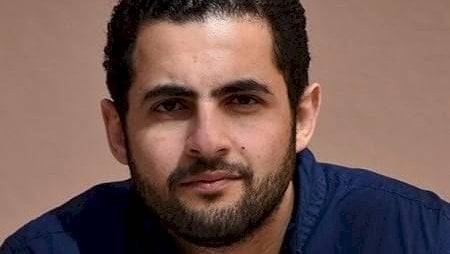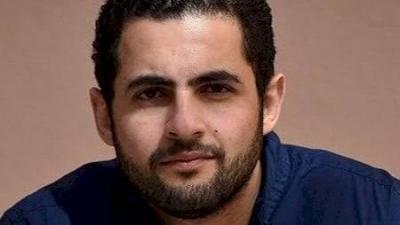Elaph from Washington: How a young Egyptian, previously aligned with the Islamic current and raised with a hatred for Jews, has transformed into a lobbyist in Washington advocating for closer Arab-Israeli ties, believing that this normalization is one of the key solutions for freeing the Arab region from the "evil of Iran."
Hussein Abu Bakr Mansour, an Egyptian-American analyst, fled from the regime of the late Egyptian President Mohamed Morsi in 2012 and now meets with decision-makers in Washington, D.C., to create a coalition against extremism. In Egypt, he has been labeled as the "Islamist" who has turned to "Zionism," according to a report from the Egyptian newspaper Al-Watan, which noted that he travels between Tel Aviv and Washington to promote Zionism worldwide and advocate for normalization with Israel.
In Israel, however, they see the 35-year-old Egyptian-American analyst as doing the right thing, as he walks on the path of "inevitable rapprochement from the Israeli perspective" between Arabs and Israelis. In an interview with the Times of Israel from his home in Washington, Mansour stated, "If the trend of normalization continues, the next generation of Arabs will be culturally immune to Iran and its dangerous ideologies."
About two months ago, he was appointed at the Jerusalem Center for Public Affairs (JCFA), a prominent Israeli research center formerly known as the Jerusalem Center for Public Affairs. His mission is to promote his vision for a new Middle East with decision-makers in Washington, both American and foreign, through personal meetings and public talks. His declared goal is to advocate for "creating a new regional political reality in which the dominant Arab forces in the region accept Israel, and creating a new cultural reality that replaces the current one."
Mansour stated, "This is what Iran attempted to stop on October 7." Tehran's plan to extend its claws throughout the region through proxy militias unleashed against Israel is causing concern among many of its Arab neighbors. Mansour noted, "There is a consensus today between how some Arabs see things and how the Israelis view them; we understand that Israel is here to stay. We recognize that the establishment of a Palestinian state is not the actual catalyst for this conflict; rather, Iran is the real catalyst for this conflict."
He continued, "We have decided to bring these Israeli and Arab voices together because that is completely lacking in Washington. There is a huge gap between how we see the region and how people in the capital, in Western academia and Western media generally, view it. We want to help people here see this different perspective, and we hope it changes the way they formulate policies for the region."
Mansour was born in 1989 to a Muslim family in Cairo and grew up in an environment steeped in anti-Israel sentiment. Egypt has served as the Iran of the region for decades, ideologically leading the entire anti-Zionist project. Opposition to Israel was one of the ideological pillars of President Gamal Abdel Nasser's regime, the socialist leader who led the country between 1956 and 1970 and shaped Egyptian national identity.
Although Nasser's successor, Anwar Sadat, signed a peace treaty with Israel in 1979, the diplomatic breakthrough never translated into acceptance of Israel among the Egyptian populace, primarily due to widespread hatred of Jews in Egyptian society. Mansour recalled, "When I was growing up, anti-Semitism was everywhere—stories about conspiracies, espionage, and evil Jews plotting in basements for wicked schemes when I was a child; I loved this stuff—I was obsessed with it." His favorite childhood reads were from the "Impossible Man" series, depicting the heroic deeds of an Egyptian secret agent against Zionist enemies.
His coming of age coincided with a wave of unrest in the Arab world sparked by the Second Intifada, the September 11 attacks, and the subsequent wars in Iraq and Afghanistan, as well as the rise of Al Jazeera and its incendiary rhetoric against the West and Israel. Mansour said, "Perhaps my generation is the most indoctrinated in modern history of the region."
He began self-studying Hebrew online, then studied it at Cairo University. However, as he learned more about Israeli society, he began frequenting the Israeli academic center at the Israeli embassy in Cairo starting in 2009, which raised suspicions among Egyptian intelligence officers. He was monitored and eventually imprisoned. His participation in the 2011 Arab Spring protests in Tahrir Square in Cairo exposed him further and put his life at risk, leading to his escape to the United States in 2012, where he was granted political asylum.
In America, he quickly secured a job teaching Hebrew at the military academy in California. "How many countries accept a complete foreigner and grant them a job in their security institution because they are suitable? That's the beauty of America," he remarked. He obtained American citizenship in 2017.
Today, he insists he does not want to be seen as a symbolic Arab advocating for Israel. He emphasizes that Arab commentators who support Israel are often portrayed as trying to "score points" in line with American identity politics. Instead, he decided to take his activism a step further, toward a more realistic direction for the Middle East as a whole. He joked, "Intellectuals are good at talking about problems, but when they offer solutions, they are a disaster."
He added, "I have spent my life trying to understand why I was raised this way and why the Middle East is in this state." His beliefs have shaped modern Arab identity and Arab nationalism, but also Islamic identity. This line of thought led to the birth of Islamism as a struggle to realize the meaning of Islam throughout history.
Mansour pointed out that ultimately, intellectual analysis can only assist in understanding the root causes of extremism afflicting Arab societies, but it does not provide concrete answers. He stated, "The solution lies with decision-makers and statesmen, in a strategy that brings Arabs and Israelis together to confront Iran and its Islamic agenda."
In his new role as an activist in the corridors of power in Washington, Mansour is also able to sit down with diplomats from Arab countries, many of whom share his vision. "On a personal level, there are issues they also understand; they realize that accepting Israel is essentially the new test for Arabs, between those belonging to the previous century of destruction and those who have moved beyond it."




